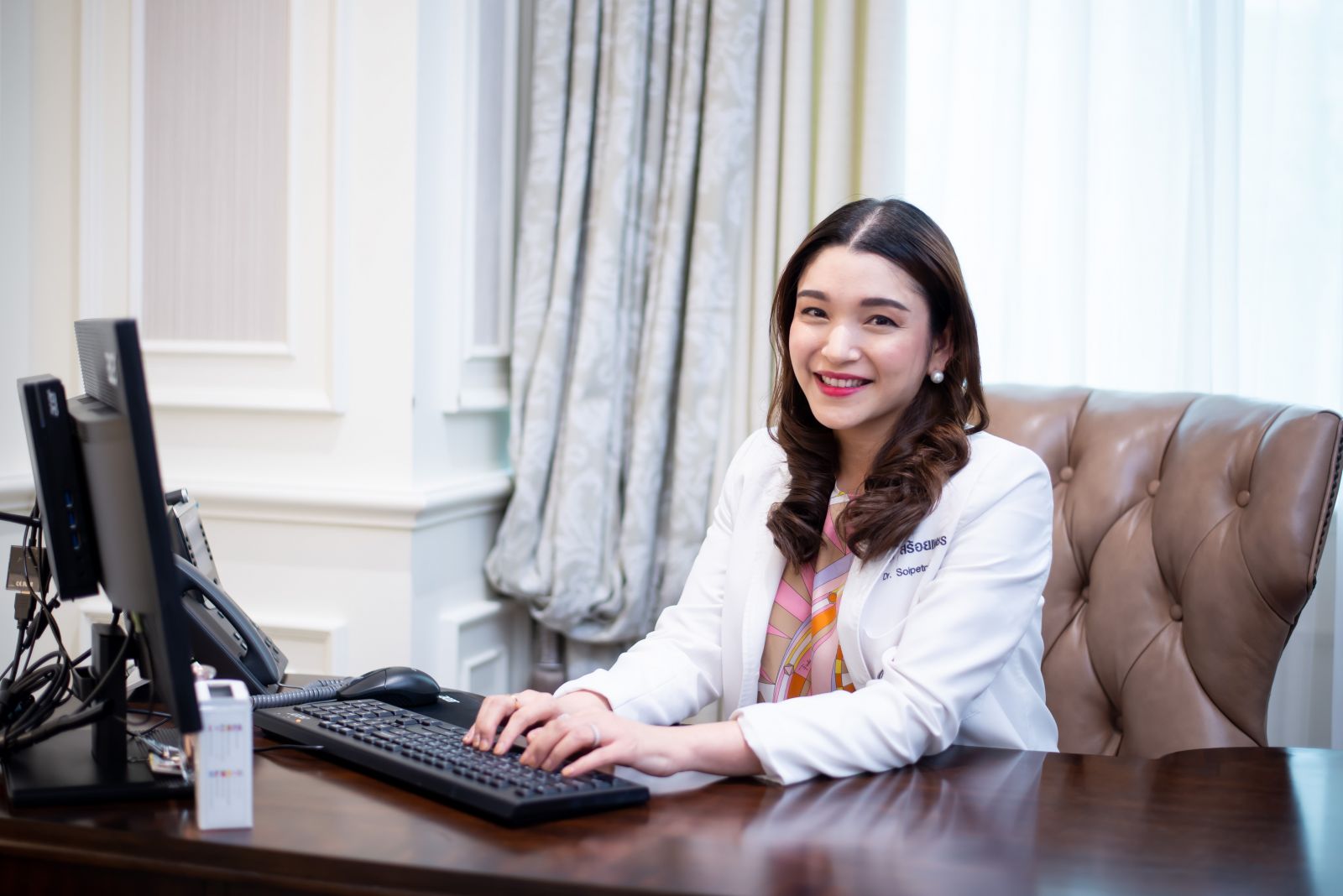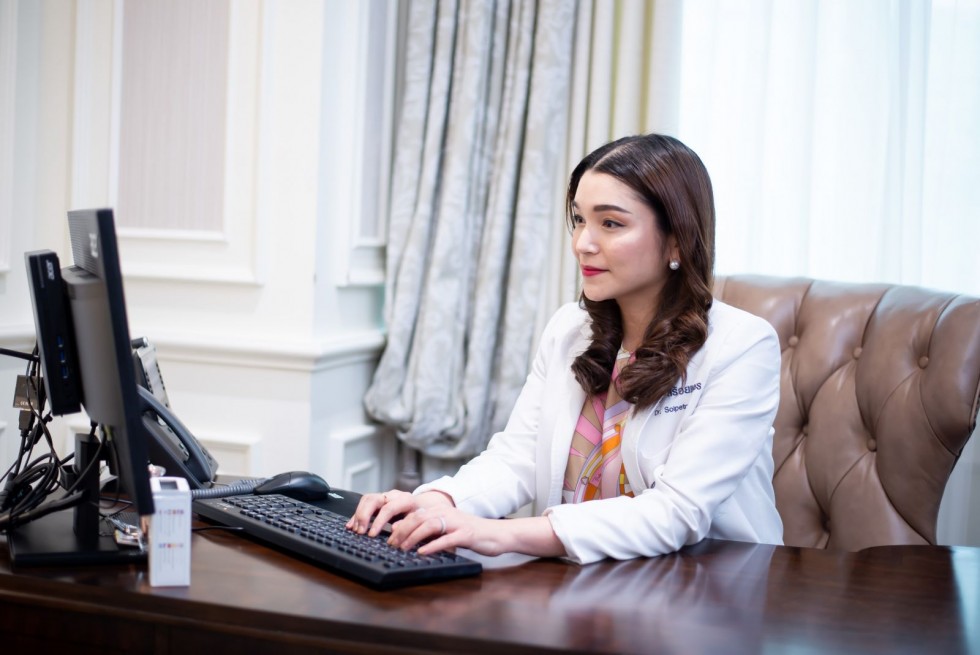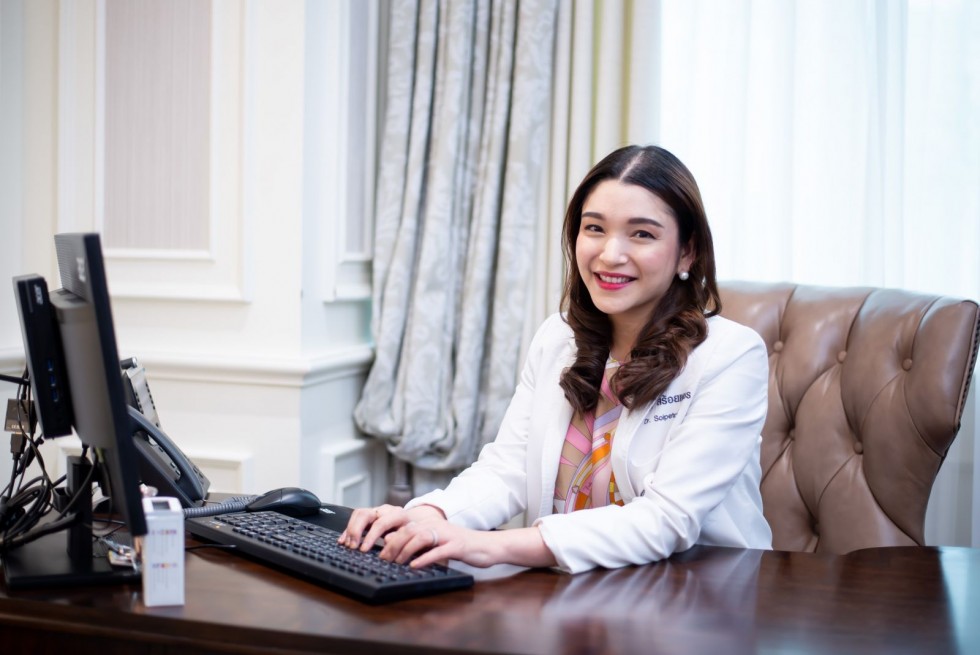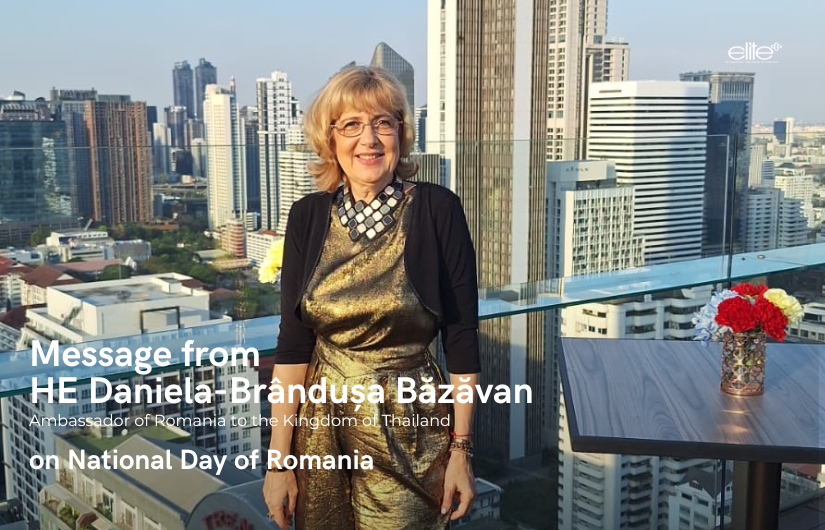During this time, she worked in the Obstetrics and Gynaecology department and because of this, she decided to return to Ramathibodi Hospital to specialise in this field. Following three years of training, Dr Soipetch decided to focus on childbirth and related surgery, but after two more years, she realised what interested her most was treating patients experiencing menopause, when a woman's ovaries stop producing the hormones estrogen and progesterone.
It was at this point in her life that Elite+ began our interview of the quite charming Dr Soipetch as she explained how she became so interested in the field of anti-aging.
Why did you decide to change your specialization?
I had a colleague who had been an obstetrician and then decided to specialize in anti-aging. He told me that working in this field would provide me a much wider range of opportunities to care for patients, as we treat or supervise from the very young to the elderly. Treatments are very wholistic. In addition to prescribing hormones and supplements, recommendations for lifestyle, exercise and dietary changes are also quite important.
What was required to make this change in your specialization?
Initially, I started to use what I learned adjusting my own eating and exercise habits. I also enrolled in courses to be certified by the American Board of Anti-Aging / Regenerative Medicine (ABAARM), and I continue to take courses, for example, before the Covid-19 pandemic, I had the opportunity to take a short course in “Lifestyle Medicine” at Harvard University.
Could you explain a little more about menopause? Is this something a man can experience as well as a woman?
First of all, menopause is much more easily recognized and diagnosed in a woman. It begins as her monthly menstruation declines and then stops. They will experience a number of different symptoms, like hot flashes, night sweats, vaginal dryness, agitation and lethargy. We can check a woman’s blood for hormone levels to determine if her menopause has begun and for some, it can last up to five years.
As I said previously, healthcare for a menopause patient includes prescribing suitable nutrition and exercise. This includes having them take calcium and vitamins, especially Vitamin D, to strengthen their bones as they can become soft and spongy during this time.
When we use the term male menopause, we are also talking about changes in hormonal levels, but not as drastic as in women. Still, this can cause men to become moody and easily irritable, suffer from short-term memory loss, feebleness and an inability to complete sexual intercourse. Like with a woman, we can check for hormone levels, particularly testosterone, and then prescribe a wholistic treatment regime.
What are diseases, both physical and mental, the elderly and menopause patients suffer from?
The diseases we commonly find in menopause patients are NCDs, or non-communicable diseases such as diabetes, cardiovascular diseases, cancer and Alzheimer’s. The Thai population has a very high rate of NCDs. This is the result of the way we live; therefore, adjusting living habits at a young age can help prevent NCDs.
This means keeping one’s weight down and eating a balanced diet, avoiding too much sugar or salt to prevent diabetes and hypertension that can be caused by these and obesity. Regular exercise is also a key to a healthy lifestyle. It is recommended that we exercise around 150 to 300 minutes per week to strengthen our heart and lungs. People should get enough sleep as well, approximately of 7 to 9 hours each night, retiring at 10:00 to 10:30 pm. Meditation can also help a person relax and reduce stress. If a person does everything I mentioned, they can reduce the risk of contracting an NCD when they get older.
BDMS is very well known for applying new technologies in your healthcare services. Can you tell us something about these?
We use different technologies to test hormone, vitamin and cell levels as I explained earlier. We also check genes to predict genetic disorders as some diseases can be inherited from parents or ancestors and by early preventative diagnosis, we can prescribe a regime to preclude the onset of an NCD.
Regular medical examinations, or checkups, are important for everyone, and at BDMS, we stress this fact so we can detect a disorder at the earliest stages to take preventative action before any condition does manifest itself.
A basic examination at BDMS Wellness Clinic includes a Fast Blood Sugar (FBS) test, Lipid Profile, Liver Function Test (LFT), Renal Function Test and Complete Blood Count (CBC). For some of these tests, we send the specimens we take to labs in foreign countries known for their expertise.
Can you tell us a little about how you will use the test results?
Well, in a genetic test, we can see if a patient is susceptible to a disease inherited from a parent, like diabetes. If we see the possibility of a patient in the future suffering from this NCD, we can advise them to immediately adjust their diet, reduce or stop intake of sugar and carbohydrates. If there is the chance of a patient incurring colon cancer, then we will prescribe a gastroscopic examination.
In our lifestyle analysis, we can prescribe a diet suitable to a patient’s digestive system. We might prescribe a low carbohydrate diet to help a patient lose weight and improve their blood test results.
Today, obesity is a big problem in Thailand, like many countries around the world. Do you treat this condition much?
When patients come here for an examination, they often worry about what the scale records for their body weight, but weight alone does not actually tell enough. What’s important to remember is obesity is determined by the percentage of a person’s body fat. This is why we give a Lipid Profile Test and have found that many Thais suffer from hyperlipoidemia.
Body Mass Index (BMI) is actually a simple way of screening because it doesn’t need any special medical device to determine BMI, just a person’s height and weight. However, body muscle volume is another important factor. For example, if there are two people who weigh 90 kilograms and have the same height, but one of them has a lot of muscles while the other doesn’t, their Body Mass Index will be the same but one is healthy and the other could be obese. So, Body Mass Index can only be applied as a tentative screening.
Now, what about memory loss?
There is of course dementia and Alzheimer’s, but what we have found is that as people age, they can become more forgetful even if they don’t suffer from one of these genetic disorders. This can be prevented, however, through brain exercise, such as doing crossword puzzles and sudoku, playing chess and other mind games. We can also prevent this by eating food with high antioxidants such as berries, oranges and kiwi, which are good for the nervous system.
For the elderly who live alone, interaction with others, like group activities, is very important for memory retention.
What kind of physical exercise would you recommend for the elderly?
Their physical exercise should cover four categories: cardiovascular, muscle strengthening, flexibility and balance. Previously, we would prescribe a general regime, but we’ve learned that each person has their individual needs and conditions. So, they should consult their physician.
We generally suggest they should not over exert themselves; 30-45 minutes of slow exercise is recommended following 15 minutes of warm up and ending by 15 minutes to cool down.
Returning to the subject of hormones, how do we know what our body needs?
Hormones are a biochemical substance our bodies create and are found in a number of parts of our body that form the endocrine system such as the thyroid, ovaries, testis, adrenal glands and pancreas. From birth to the age of around 30, the system usually works perfectly, but after that the hormones begin to decrease sometimes because of lifestyle, not getting enough sleep, getting stressed out by work, not exercising, not consuming a healthy diet, and I could go on.
There are no specific symptoms, but when I discussed menopause, I named a few like lethargy, irritability and unstable weight. If anyone feels any of these symptoms, I recommend they consult their physician and get a blood test.
BDMS Wellness Clinic offers a personalized vitamin treatment. Could you explain about this?
Vitamins are normally in the food we consume; however, nowadays many people consume a huge amount of fast food and, therefore, don’t get all the vitamins they need. Vitamins are like a body’s lubricant. Even though they don’t provide energy, like proteins, fat or carbohydrates, we still need vitamins as they help body systems function. If the body lacks vitamins, our immune and nervous systems, skin, hair and nails will not function properly.
However, every person is different and so their bodies have different needs. If we take vitamins our body doesn’t need, this can have a negative effect on our liver and kidneys. We have our patients undergo different tests, including a blood test, before we prescribe a personalized cocktail of vitamins and supplements just for them.
With Covid-19, many people have had to alter their work and leisure lifestyle. Do you have any advice for them to stay healthy?
People working at home have to be careful about gaining weight as they might not get enough exercise and their eating habits might be dependent on food deliveries. I recommend they watch what they eat and exercise. If they cannot get out in the sun, they should take Vitamin D to strengthen their immune system, and again get enough sleep.
Any final thoughts for our readers?
A healthy lifestyle is vital, and good health begins with what we eat. As has been said, “You are what you eat”, and eating healthy will keep you healthy while eating junk food can become toxic for your body. Exercise also helps clear and brighten your mind as well as reduce the risk of depression as we get older. Getting enough sleep, meditation, volunteering or being active outdoors can also help us become healthier. Therefore, live right and take care of your health.



















































































































































































































































































































































































































































































































































































































































































































































































































































































































